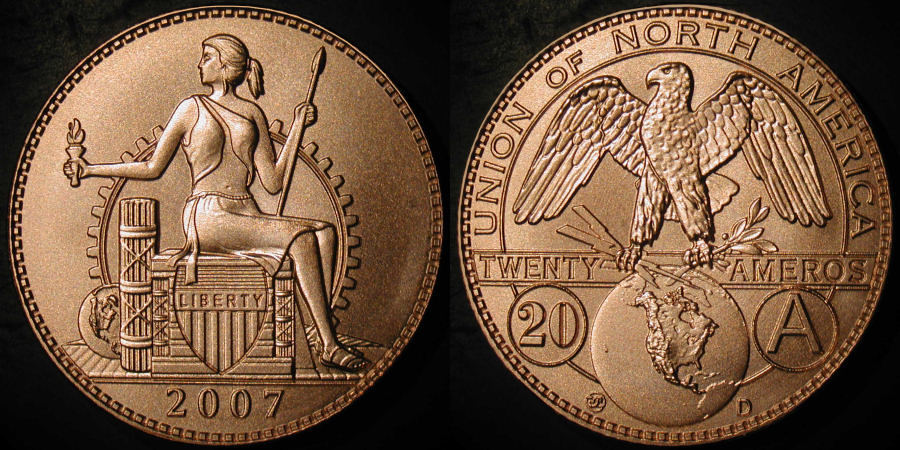Pictures of the new currency that will supposedly replace the US dollar have appeared on the Russian Internet. The United States is reportedly working on the new currency, the amero, which will be common for the USA, Mexico and Canada. The unstable financial situation in the world, the collapsing oil prices and the growing foreign debt of the United States may eventually crush the US dollar as the world’s major currency. Needless to say that the US authorities reject the rumors and promise to keep the dollar afloat.
Amero notes have no portraits of US presidents on them and resemble the Belarussian rubles. For example, there is an image of a deer depicted on a 50-amero note, whereas a picture of a pyramid of Mexican Indians can be seen on a 100-amero note.
The amero follows the model of the European Union and its euro. It brings up the idea that the new currency can be adopted by the USA, Canada and Mexico within the scope of the North American Union, which the Bush administration established in 2005 under the Security and Prosperity Partnership of North America (SPP).
On April 6, 2005, the US Treasury announced the formation of the Financial Services Working Group to assist in the SPP’s ‘prosperity’ plans. According to its own press release, the US Treasury’s Financial Services Working Group said it “will play a critical role in the SPP.”
Conspiracy theorists contend that the governments of the United States, Canada, and Mexico are already taking steps to implement such a currency, as part of a "North American Union (NAU)" No current members of any country's government have officially stated a desire to create such a body, nor introduce a common currency.
The idea for a North American currency union was first proposed in 1999 by Canadian economist Herbert G. Grubel. A senior fellow of the conservative Fraser Institute think-tank, he published a book titled The Case for the Amero in September 1999, the year that the euro became a virtual currency. Another Canadian think-tank, the C.D. Howe Institute, advocates the creation of a shared currency between Canada and the United States .
After the report came out, center-left nationalist groups in Canada expressed their opposition to any currency union because they view it as an attempt by American businesses to gain access to Canada 's extensive natural resources while dismantling the nation's social services. The 100,000 member strong Council of Canadians, a progressive advocacy group, has declared one of its central issues to be the threat of "deep integration".
Dr. Robert Pastor, in a 2001 book, suggested a common currency should be a foundation of "macro economic cooperation" among the three NAFTA countries. However, the 2005 Independent Task Force on North America, which he chaired, did not recommend a common currency, nor does Pastor in the section for additional and dissenting views suggest a common currency should be a goal.

Amero to become USA’s new currency when dollar collapses
Amero notes have no portraits of US presidents on them and resemble the Belarussian rubles. For example, there is an image of a deer depicted on a 50-amero note, whereas a picture of a pyramid of Mexican Indians can be seen on a 100-amero note.
The amero follows the model of the European Union and its euro. It brings up the idea that the new currency can be adopted by the USA, Canada and Mexico within the scope of the North American Union, which the Bush administration established in 2005 under the Security and Prosperity Partnership of North America (SPP).
On April 6, 2005, the US Treasury announced the formation of the Financial Services Working Group to assist in the SPP’s ‘prosperity’ plans. According to its own press release, the US Treasury’s Financial Services Working Group said it “will play a critical role in the SPP.”
Conspiracy theorists contend that the governments of the United States, Canada, and Mexico are already taking steps to implement such a currency, as part of a "North American Union (NAU)" No current members of any country's government have officially stated a desire to create such a body, nor introduce a common currency.
The idea for a North American currency union was first proposed in 1999 by Canadian economist Herbert G. Grubel. A senior fellow of the conservative Fraser Institute think-tank, he published a book titled The Case for the Amero in September 1999, the year that the euro became a virtual currency. Another Canadian think-tank, the C.D. Howe Institute, advocates the creation of a shared currency between Canada and the United States .
After the report came out, center-left nationalist groups in Canada expressed their opposition to any currency union because they view it as an attempt by American businesses to gain access to Canada 's extensive natural resources while dismantling the nation's social services. The 100,000 member strong Council of Canadians, a progressive advocacy group, has declared one of its central issues to be the threat of "deep integration".
Dr. Robert Pastor, in a 2001 book, suggested a common currency should be a foundation of "macro economic cooperation" among the three NAFTA countries. However, the 2005 Independent Task Force on North America, which he chaired, did not recommend a common currency, nor does Pastor in the section for additional and dissenting views suggest a common currency should be a goal.

Amero to become USA’s new currency when dollar collapses

 Bankruptcy Wizard
Bankruptcy Wizard
 (The whole country cherishes deer, hunting them, skin them, and eat them too??) j/k... and what that?? I see two black birds/butterfly??... and a Kangaroo from AUS??
(The whole country cherishes deer, hunting them, skin them, and eat them too??) j/k... and what that?? I see two black birds/butterfly??... and a Kangaroo from AUS??



Comment